halcon基础数据类型详解
Halcon算法加速的基础知识(多核并行GPU)

Halcon算法加速的基础知识(多核并⾏GPU)⼀、提⾼Halcon的运算速度,有以下⼏种⽅法:1、Multithreading(多线程)2、Automatic Parallelization(⾃动操作并⾏化)3、Compute devices,利⽤GPU提速,如果显卡性能好,⾄少可以提⾼5~10倍的运算速度⼆、多线程1、官⽅⾃带的例程get_operator_info.hdev,可以查看⽀持多线程的算⼦;1 * Determine the multithreading information2 get_multithreading_operators (TypeExclusive, TypeMutual, TypeReentrant, TypeIndependent)3 * ⾃定义函数展开之后,有get_operator_info算⼦4 * get names of all operators of the library5 get_operator_name ('', OperatorNames)6 get_operator_info (OperatorNames[Index], 'parallelization', Information)2、官⽅的⼿册C:\Program Files\MVTec\HALCON-19.11-Progress\doc\pdf\manuals\programmers_guide.pdfChapter 2 Parallel Programming and HALCONC:\Program Files\MVTec\HALCON-19.11-Progress\doc\pdf\reference\reference_hdevelop.pdfChapter 25 System --- 25.6 Multithreading三、多核并⾏看看官⽅的说明,关于HALCON-多核性能:1、算⼦⾃动并⾏化(AOP)Automatic Operator Parallelization (AOP)多核和多处理器的计算机显著提升了计算机视觉系统的速度。
HALCON编程及工程应用 第2章 HALCON编程基础

2. HDevelop窗口介绍
在程序编辑窗口点击右键,在下拉菜单显示程 序运行调试中的一些设置,如图2-11所示。
图2-10 程序窗口
HALCON编程基础与工程应用
图2-11 程序调试设置
2. HDevelop窗口介绍
HDevelop启动以后,就可以开始从程序窗口输入,逐步建立一个 HDevelop 程序。要在程序中新增一行,比如加一个算子,有以下两 个步骤。 (1)首先要将光标放在新增的地方,用键盘的Shift键加上的鼠标左 键,点在要加入的地方,然后从算子菜单中选择,或是由算子窗口 来选用想要加入的数据。 (2)新的算子会出现在算子窗口中,包含它的参数等数据,此时按 下“输入”,就会将它加入程序代码中,成为新增的一行;如果按下“ 确定”,除了程序代码会新增以外,同时也会执行程序。如果按的是 “应用”,算子不会新增到程序中,但是会被执行,这样就可以方便 又有效的测试修改参数的结果。 如果只要执行某一行,可以将程序计数器(PC)置于要执行的那行 前,再用鼠标左键在该行前单击,然后按HDevelop工具栏的“单步跳 过函数”,如果单击“运行”,则程序代码都会执行,直到一个断点或 是按“停止”将其中止。
HALCON编程基础与工程应用
1. 条件语句
语义为:判断表达式的值,表达式1的值非零则执行语句组1。表达式 1的值为零而表达式2的值非零则执行语句组2,两个表达式的值都为 零则执行语句组3。
【例2-3】if条件语句实例3 cont:=2 *判断变量cont是否大于等于1,大于等于1就执行语句cont:=cont-1 if(cont>=1) cont:=cont-1 *判断变量cont是否小于等于-1,小于等于-1就执行语句cont:=cont+1 elseif(cont<=-1) cont:=cont+1 *如果cont大于-1小于1执行语句 cont:=cont+2
Halcon基础知识总结(一文学会halcon基础操作,总结自超人视觉)
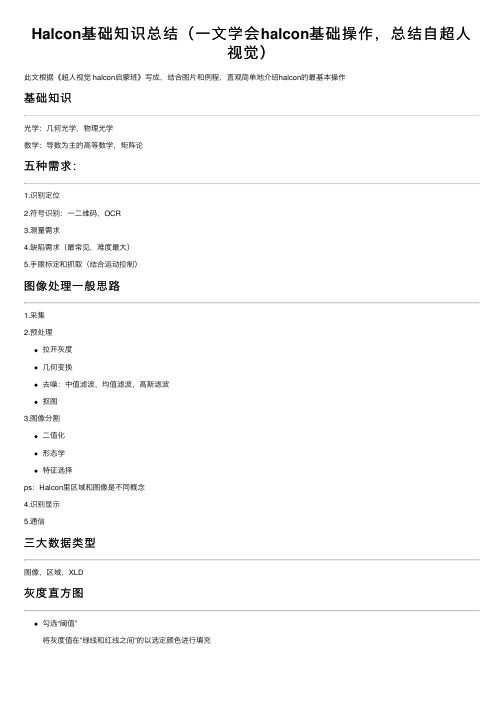
Halcon基础知识总结(⼀⽂学会halcon基础操作,总结⾃超⼈视觉)此⽂根据《超⼈视觉 halcon启蒙班》写成,结合图⽚和例程,直观简单地介绍halcon的最基本操作基础知识光学:⼏何光学,物理光学数学:导数为主的⾼等数学,矩阵论五种需求:1.识别定位2.符号识别:⼀⼆维码,OCR3.测量需求4.缺陷需求(最常见,难度最⼤)5.⼿眼标定和抓取(结合运动控制)图像处理⼀般思路1.采集2.预处理拉开灰度⼏何变换去噪:中值滤波,均值滤波,⾼斯滤波抠图3.图像分割⼆值化形态学特征选择ps:Halcon⾥区域和图像是不同概念4.识别显⽰5.通信三⼤数据类型图像,区域,XLD灰度直⽅图勾选“阈值”将灰度值在”绿线和红线之间”的以选定颜⾊进⾏填充将把圈定的阈值范围内的直⽅图均匀拉伸释放到整个直⽅图轴上数组语法* Simple tuple operationsTuple1 := [1,2,3,4,5]Number := |Tuple1|SingleElement := Tuple1[3]Part := Tuple1[1:3]Copy := Tuple1[0:|Tuple1| - 1]运⾏结果读取图⽚的四种⽅法1. ⽂件 -> 读取图⽚2. Image Acquisition -> ⾃动检测接⼝(刷新设备)-> Direct show,从摄像头直接读图3. Image Acquisition -> 选择⽂件,从图像⽂件中读取4. Image Acquisition -> 选择路径,结合正则表达式读取路径下的图⽚PS:⽤Image Acquisition读取时记得点击代码⽣成摄像头抓取模式:在可视化 -> 更新窗⼝中调整同步采集:实时抓取,⼀直抓取异步采集:只等图⽚处理完后,grab_image才开始抓取PS:更多信息包括双相机采集,可以在案例 -> ⽅法 -> 图像采集设备中学习ROI(感兴趣区域)特征检测PS:⼆值化之后的区域虽然不连通,但仍然认为是⼀个区域。
halcon算子解释

halcon算子解释
Halcon算子是Halcon软件中用于图像处理和分析任务的基本操作单元。
每一个Halcon算子都可以接收输入图像并产生输出图像或其他结果,例如区域、角度、面积等。
这些算子可以组合成更复杂的网络,以实现更高级的功能,例如识别、测量、分类、分割和跟踪任务。
Halcon的自定义算子包括算子名称、图标输入参数、图标输出参数、控制输入参数、控制输出参数等。
例如,算子名称可以是“dilation_seq”,用于顺序地扩大一个区域;或者“erosion1”,用于腐蚀一个区域。
Halcon算子的应用非常广泛,可以应用于各种图像处理和分析任务。
例如,可以使用Halcon算子进行图像增强、去噪、分割、特征提取等任务。
此外,Halcon还可以与其他编程语言和平台集成,以实现更复杂的图像处理和分析任务。
在使用Halcon算子时,需要了解每个算子的功能和参数设置,以便正确地选择和设置它们,以获得最佳的结果。
此外,还需要了解每个算子的输入和输出参数类型和格式,以确保它们与算子所需的格式匹配。
halcon中的region定义

halcon中的region定义Halcon是一种用于机器视觉应用的编程软件,它提供了丰富的图像处理和分析工具。
在Halcon中,Region是一种常用的数据类型,用于表示图像中的特定区域。
本文将介绍Halcon 中Region的定义和常见操作。
在Halcon中,Region是一种由连续的像素点组成的集合,可以用来表示图像中的物体或区域。
Region的定义可以基于像素的坐标、形状或其他特征。
Halcon提供了多种方式来定义Region,下面将介绍其中常用的几种方法。
一种常见的方式是基于像素的坐标来定义Region。
在Halcon 中,我们可以通过指定一个像素的坐标来创建一个Region,然后通过添加其他像素的坐标来扩展这个区域。
例如,我们可以使用以下代码创建一个以(100, 100)为中心,半径为50的圆形区域:```Halconcreate_ring(Ring, 100, 100, 50)```这个代码首先创建了一个空的Region对象Ring,然后使用create_ring函数将一个圆形区域添加到Ring中。
除了使用像素的坐标,我们还可以使用形状来定义Region。
Halcon中提供了多种形状,包括矩形、椭圆、多边形等。
例如,我们可以使用以下代码创建一个矩形区域:```Halconcreate_rectangle1(Rectangle, 100, 100, 200, 150)```这个代码创建了一个以(100, 100)为左上角,宽度为200,高度为150的矩形区域。
类似地,我们可以使用其他函数来创建其他形状的区域。
除了创建Region,Halcon还提供了多种操作来修改和处理Region。
例如,我们可以使用以下代码将两个Region进行并集操作:```Halconunion(Ring1, Ring2, RingUnion)```这个代码将Region Ring1和Ring2进行并集操作,并将结果保存到RingUnion中。
halcon加减乘除运算 -回复

halcon加减乘除运算-回复Halcon是一款强大的机器视觉软件,被广泛应用于工业自动化、医疗影像、交通监控等领域。
它的强大之处不仅仅在于其先进的图像处理算法,还在于其丰富的运算功能,包括加减乘除等基本运算。
下面,我将一步一步回答如何在Halcon中进行加减乘除运算。
首先,让我们了解一下Halcon的基本数据类型。
在Halcon中,数字可以用整数、浮点数和复数三种数据类型表示。
其中,整数类型表示为整数值,浮点数类型表示为带小数点的数值,复数类型表示为实部和虚部的组合。
这些数据类型可以用于各种运算操作。
Halcon中的加法运算符是"+",用于将两个数值相加。
例如,若要计算3和4的和,可以使用以下代码:Halcona := 3b := 4c := a + b这段代码首先将3赋给变量a,将4赋给变量b,然后使用运算符"+"将a和b相加,结果赋给变量c。
在代码运行后,变量c的值将变为7。
Halcon中的减法运算符是"-",用于将一个数值减去另一个数值。
以下是一个示例代码,演示如何计算9减去5的结果:Halcona := 9b := 5c := a - b这段代码将9赋给变量a,将5赋给变量b,然后使用运算符"-"将a 减去b,结果赋给变量c。
在代码运行后,变量c的值将变为4。
Halcon中的乘法运算符是"*",用于将两个数值相乘。
以下是一个示例代码,演示如何计算2乘以6的结果:Halcona := 2b := 6c := a * b这段代码将2赋给变量a,将6赋给变量b,然后使用运算符"*"将a 和b相乘,结果赋给变量c。
在代码运行后,变量c的值将变为12。
Halcon中的除法运算符是"/",用于将一个数值除以另一个数值。
以下是一个示例代码,演示如何计算10除以2的结果:Halcona := 10b := 2c := a / b这段代码将10赋给变量a,将2赋给变量b,然后使用运算符"/"将a 除以b,结果赋给变量c。
halcon的基本数据类型,数据的表示方法

halcon的基本数据类型,数据的表示方法Halcon是一种用于机器视觉应用的编程语言和开发环境。
在Halcon中,有多种基本数据类型可用于存储和表示各种类型的数据。
在这篇文章中,我们将探讨Halcon的基本数据类型以及它们的表示方法。
1.整数类型:Halcon中的整数类型包括有符号整数(INT)和无符号整数(UINT)。
有符号整数的取值范围通常为-2147483648到2147483647,而无符号整数的取值范围为0到4294967295。
整数类型可以用来存储和表示像素坐标、像素灰度值等整数类型的数据。
2.浮点数类型:Halcon中的浮点数类型包括单精度浮点数(FLOAT)和双精度浮点数(DOUBLE)。
单精度浮点数可以表示小数,并具有较高的精度和较大的范围,而双精度浮点数具有更高的精度和更大的范围。
浮点数类型适用于存储和表示测量结果、图像变换矩阵等需要较高精度的数据。
3.字符类型:Halcon中的字符类型(CHAR)用于存储和表示单个字符。
字符类型通常用于存储和处理文本字符、字符串等。
4.布尔类型:Halcon中的布尔类型(BOOL)用于表示真(TRUE)和假(FALSE)的值。
布尔类型适用于存储和判断逻辑条件的结果。
5.枚举类型:Halcon中的枚举类型(ENUM)用于定义一组具有固定取值范围的符号常量。
枚举类型适用于表示具有多个离散取值选项的数据。
6.数组类型:Halcon中的数组类型用于存储和表示多个具有相同数据类型的值的有序集合。
数组可以是一维的、二维的或多维的,并且可以包含不同的数据类型,如整数、浮点数、字符等。
7.字符串类型:Halcon中的字符串类型用于存储和表示一系列字符的有序集合。
字符串类型可以包含文本字符、数字字符和特殊字符,并且可以进行字符串操作和处理。
8.元组类型:Halcon中的元组类型用于存储和表示具有不同数据类型的项的有序集合。
元组可以包含整数、浮点数、字符、数组、字符串等等。
halcon的基本数据类型,数据的表示方法
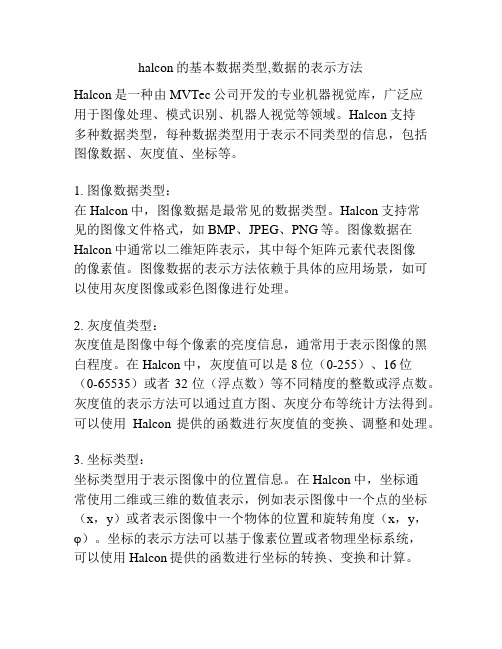
halcon的基本数据类型,数据的表示方法Halcon是一种由MVTec公司开发的专业机器视觉库,广泛应用于图像处理、模式识别、机器人视觉等领域。
Halcon支持多种数据类型,每种数据类型用于表示不同类型的信息,包括图像数据、灰度值、坐标等。
1. 图像数据类型:在Halcon中,图像数据是最常见的数据类型。
Halcon支持常见的图像文件格式,如BMP、JPEG、PNG等。
图像数据在Halcon中通常以二维矩阵表示,其中每个矩阵元素代表图像的像素值。
图像数据的表示方法依赖于具体的应用场景,如可以使用灰度图像或彩色图像进行处理。
2. 灰度值类型:灰度值是图像中每个像素的亮度信息,通常用于表示图像的黑白程度。
在Halcon中,灰度值可以是8位(0-255)、16位(0-65535)或者32位(浮点数)等不同精度的整数或浮点数。
灰度值的表示方法可以通过直方图、灰度分布等统计方法得到。
可以使用Halcon提供的函数进行灰度值的变换、调整和处理。
3. 坐标类型:坐标类型用于表示图像中的位置信息。
在Halcon中,坐标通常使用二维或三维的数值表示,例如表示图像中一个点的坐标(x,y)或者表示图像中一个物体的位置和旋转角度(x,y,φ)。
坐标的表示方法可以基于像素位置或者物理坐标系统,可以使用Halcon提供的函数进行坐标的转换、变换和计算。
4. 角度类型:角度类型用于表示图像中物体的旋转角度信息。
在Halcon中,角度可以以弧度或度数表示,通常取值范围为-π到π或者0到360。
角度的表示方法可以通过直接测量或者基于特征匹配等方式得到。
可以使用Halcon提供的函数进行角度的转换、调整和计算。
5. 多边形类型:多边形类型用于表示图像中物体的轮廓信息。
在Halcon中,多边形通常由一组连续的点坐标表示,每个点的坐标按照顺时针或逆时针顺序连接形成一个封闭的轮廓。
多边形的表示方法可以基于边缘检测、轮廓提取等方式得到。
halcon 区域数值, xld数组
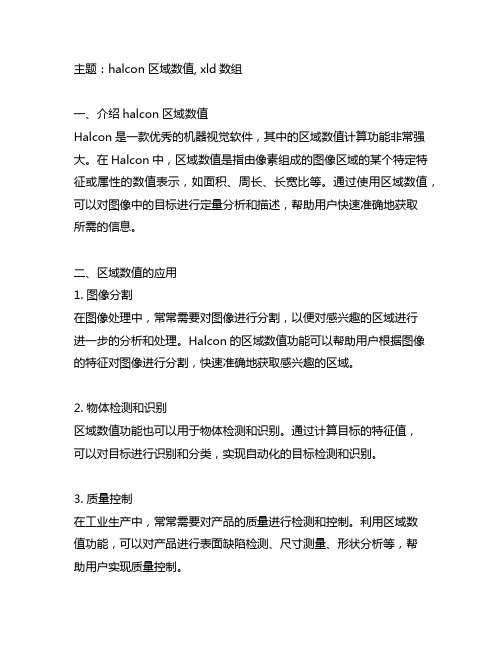
主题:halcon 区域数值, xld数组一、介绍halcon区域数值Halcon是一款优秀的机器视觉软件,其中的区域数值计算功能非常强大。
在Halcon中,区域数值是指由像素组成的图像区域的某个特定特征或属性的数值表示,如面积、周长、长宽比等。
通过使用区域数值,可以对图像中的目标进行定量分析和描述,帮助用户快速准确地获取所需的信息。
二、区域数值的应用1. 图像分割在图像处理中,常常需要对图像进行分割,以便对感兴趣的区域进行进一步的分析和处理。
Halcon的区域数值功能可以帮助用户根据图像的特征对图像进行分割,快速准确地获取感兴趣的区域。
2. 物体检测和识别区域数值功能也可以用于物体检测和识别。
通过计算目标的特征值,可以对目标进行识别和分类,实现自动化的目标检测和识别。
3. 质量控制在工业生产中,常常需要对产品的质量进行检测和控制。
利用区域数值功能,可以对产品进行表面缺陷检测、尺寸测量、形状分析等,帮助用户实现质量控制。
三、介绍xld数组与区域数值类似,xld数组也是Halcon中的一项重要功能。
xld是指由像素组成的线或轮廓的数组表示。
在Halcon中,xld数组可以用于描述图像中的线和轮廓的特征,如长度、角度、弧长等。
四、xld数组的应用1. 边缘检测利用xld数组,可以对图像中的边缘进行检测和提取。
通过计算边缘的特征值,可以实现对边缘的定量分析和描述。
2. 直线拟合xld数组还可以用于直线拟合。
通过对xld数组进行拟合,可以实现对图像中的直线进行提取和拟合,为后续的分析和处理提供数据支持。
3. 轮廓分析在图像分析中,轮廓是一个重要的特征。
利用xld数组,可以对图像中的轮廓进行提取、描述和分析,实现对图像中目标轮廓的定量化分析。
五、结语Halcon的区域数值和xld数组功能为用户提供了强大的图像分析和处理工具,帮助用户快速准确地获取图像中的目标信息,实现自动化的图像分析和处理。
在日常的图像处理工作中,利用Halcon的区域数值和xld数组功能可以大大提高工作效率和分析精度,是不可或缺的重要工具。
halcon 函数参数

Halcon 函数参数一、什么是 Halcon 函数参数Halcon 是一种用于机器视觉应用开发的软件库,它提供了一系列函数来处理图像和进行图像分析。
在使用 Halcon 进行开发时,函数参数是非常重要的一部分。
函数参数是指在调用函数时传递给函数的值,它们决定了函数的行为和输出结果。
正确理解和使用函数参数是使用 Halcon 进行图像处理的关键。
二、Halcon 函数参数的基本规则在使用 Halcon 函数时,我们需要遵循一些基本的规则来正确地设置函数参数。
以下是一些常见的规则:1.函数参数的顺序很重要:在调用函数时,参数的顺序必须与函数定义时的顺序一致,否则可能会导致错误的结果。
2.函数参数的类型必须匹配:函数参数必须与函数定义时指定的类型相匹配,否则会导致编译错误或运行时错误。
3.函数参数的数量必须正确:函数调用时必须传递正确数量的参数,否则会导致编译错误或运行时错误。
4.函数参数可以是常量或变量:函数参数可以是常量或变量,常量是指在函数调用时直接指定的值,变量是指在函数调用前定义并赋值的值。
三、Halcon 函数参数的类型Halcon 函数参数的类型包括基本类型和复合类型。
基本类型包括整数、浮点数、字符串等,而复合类型包括数组、图像、区域等。
以下是一些常见的函数参数类型:1.整数:用于表示整数值,如图像的宽度、高度等。
2.浮点数:用于表示浮点数值,如图像的灰度值、像素坐标等。
3.字符串:用于表示文本信息,如文件路径、图像名称等。
4.数组:用于表示一组相同类型的值,如图像的像素值数组。
5.图像:用于表示图像数据,如读取图像、显示图像等。
6.区域:用于表示图像中的感兴趣区域,如提取区域、合并区域等。
四、Halcon 函数参数的传递方式在调用 Halcon 函数时,函数参数可以通过值传递或引用传递的方式进行传递。
以下是两种传递方式的特点:1.值传递:函数参数的值在函数调用时被复制到函数的局部变量中,函数对局部变量的修改不会影响到原始参数的值。
使用halcon描述与实现

使用halcon描述与实现使用Halcon描述与实现Halcon是一种广泛应用于机器视觉领域的软件工具,它提供了强大的图像处理和分析功能,可以帮助我们解决各种视觉相关的问题。
本文将介绍Halcon的基本概念和使用方法,并以一个简单的示例来演示如何使用Halcon进行图像处理。
Halcon主要由一系列的函数和算子组成,这些函数可以用来实现图像的读取、显示、处理和分析等操作。
在使用Halcon之前,我们首先需要了解一些基本概念。
图像是Halcon中的基本数据类型,它由像素组成,每个像素包含了图像中一个点的亮度信息。
Halcon支持多种图像格式,包括灰度图像、彩色图像和深度图像等。
我们可以使用Halcon提供的函数来读取和显示图像,例如read_image和disp_image函数。
在进行图像处理时,我们通常需要对图像进行一系列的操作,例如滤波、边缘检测和形态学处理等。
Halcon提供了丰富的函数和算子来实现这些操作。
例如,我们可以使用filter函数来对图像进行滤波处理,使用edges_image函数来进行边缘检测,使用morphology 函数来进行形态学处理。
除了基本的图像处理操作,Halcon还提供了一些高级的功能,例如模板匹配、特征提取和目标定位等。
这些功能可以帮助我们解决一些复杂的视觉问题。
例如,我们可以使用find_shape_model函数来进行模板匹配,使用shape_feature函数来提取图像的特征,使用find_local_max函数来定位图像中的目标等。
为了更好地理解Halcon的使用方法,我们接下来以一个简单的示例来演示如何使用Halcon进行图像处理。
假设我们有一张包含一些圆形目标的图像,我们的任务是找到图像中所有的圆形目标并标记出来。
我们可以使用read_image函数读取图像,并使用disp_image函数显示图像。
然后,我们可以使用threshold函数将图像转换为二值图像,只保留目标区域。
halcon string类型
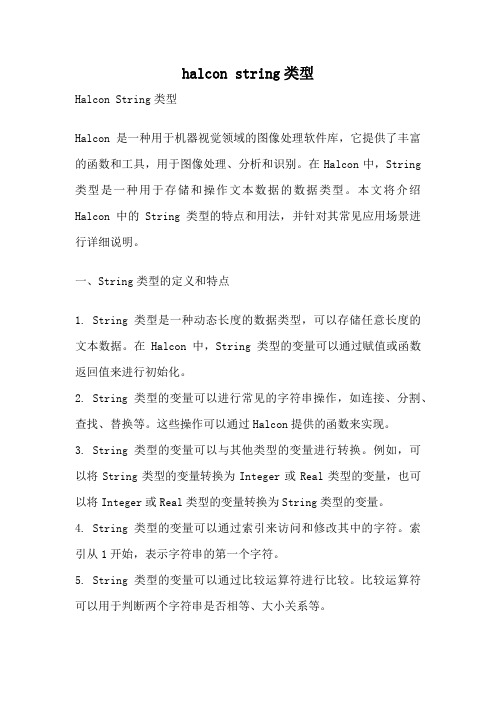
halcon string类型Halcon String类型Halcon是一种用于机器视觉领域的图像处理软件库,它提供了丰富的函数和工具,用于图像处理、分析和识别。
在Halcon中,String 类型是一种用于存储和操作文本数据的数据类型。
本文将介绍Halcon中的String类型的特点和用法,并针对其常见应用场景进行详细说明。
一、String类型的定义和特点1. String类型是一种动态长度的数据类型,可以存储任意长度的文本数据。
在Halcon中,String类型的变量可以通过赋值或函数返回值来进行初始化。
2. String类型的变量可以进行常见的字符串操作,如连接、分割、查找、替换等。
这些操作可以通过Halcon提供的函数来实现。
3. String类型的变量可以与其他类型的变量进行转换。
例如,可以将String类型的变量转换为Integer或Real类型的变量,也可以将Integer或Real类型的变量转换为String类型的变量。
4. String类型的变量可以通过索引来访问和修改其中的字符。
索引从1开始,表示字符串的第一个字符。
5. String类型的变量可以通过比较运算符进行比较。
比较运算符可以用于判断两个字符串是否相等、大小关系等。
二、String类型的常见用法1. 字符串拼接String类型可以用于将多个字符串拼接成一个字符串。
例如,可以将名字和年龄拼接成一个句子,用于输出或保存。
拼接字符串可以使用字符串连接运算符"+",也可以使用Halcon提供的字符串连接函数Concat。
2. 字符串分割String类型可以用于将一个字符串分割成多个子字符串。
例如,可以将一个包含多个姓名的字符串,按照逗号进行分割,并将每个姓名存储到一个String类型的数组中。
字符串分割可以使用字符串分割函数SplitStr。
3. 字符串查找和替换String类型可以用于在一个字符串中查找指定的子字符串,并进行替换。
halcon条码类型
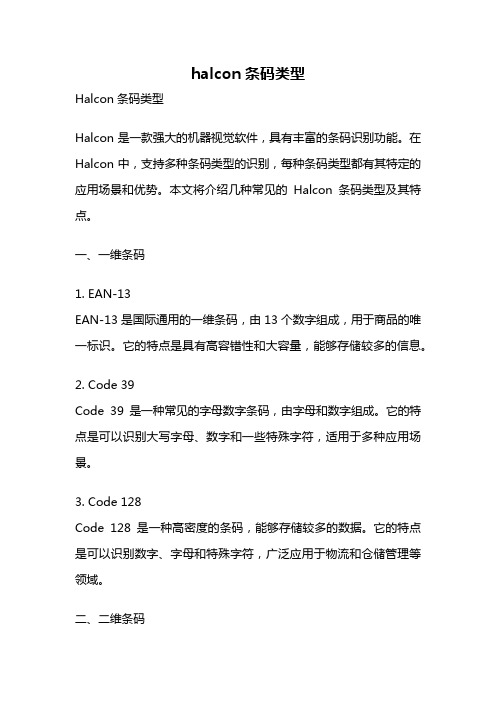
halcon条码类型Halcon条码类型Halcon是一款强大的机器视觉软件,具有丰富的条码识别功能。
在Halcon中,支持多种条码类型的识别,每种条码类型都有其特定的应用场景和优势。
本文将介绍几种常见的Halcon条码类型及其特点。
一、一维条码1. EAN-13EAN-13是国际通用的一维条码,由13个数字组成,用于商品的唯一标识。
它的特点是具有高容错性和大容量,能够存储较多的信息。
2. Code 39Code 39是一种常见的字母数字条码,由字母和数字组成。
它的特点是可以识别大写字母、数字和一些特殊字符,适用于多种应用场景。
3. Code 128Code 128是一种高密度的条码,能够存储较多的数据。
它的特点是可以识别数字、字母和特殊字符,广泛应用于物流和仓储管理等领域。
二、二维条码1. QR码QR码是一种常见的二维条码,由黑白方块组成。
它的特点是可以存储较多的信息,具有高容错性和快速识别的优势。
QR码广泛应用于移动支付、电子票务等领域。
2. Data MatrixData Matrix是一种紧凑型的二维条码,由黑白方块组成。
它的特点是可以存储较多的数据,具有高容错性和可靠性。
Data Matrix 常用于电子元件追溯、物流管理等领域。
3. PDF417PDF417是一种高密度的二维条码,能够存储大量的数据。
它的特点是具有高容错性和可靠性,广泛应用于票务、身份证等领域。
三、其他条码类型除了一维条码和二维条码,Halcon还支持其他一些特殊的条码类型,如GS1 DataBar、Pharmacode等。
这些条码类型在特定的应用场景中有着重要的作用,能够提高识别的准确性和效率。
总结:Halcon作为一款强大的机器视觉软件,具有丰富的条码识别功能。
通过对不同类型的条码进行识别,可以实现对产品信息、物流信息等的快速获取和处理。
不同的条码类型适用于不同的应用场景,需要根据具体需求选择合适的条码类型进行应用。
halcon 可视化参数
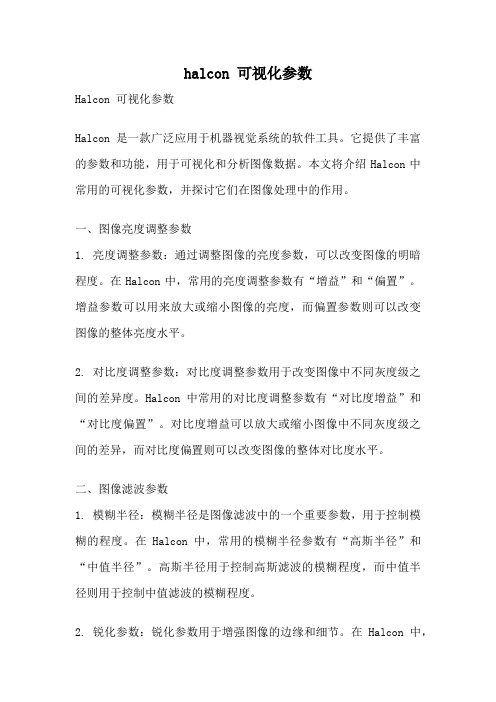
halcon 可视化参数Halcon 可视化参数Halcon是一款广泛应用于机器视觉系统的软件工具。
它提供了丰富的参数和功能,用于可视化和分析图像数据。
本文将介绍Halcon中常用的可视化参数,并探讨它们在图像处理中的作用。
一、图像亮度调整参数1. 亮度调整参数:通过调整图像的亮度参数,可以改变图像的明暗程度。
在Halcon中,常用的亮度调整参数有“增益”和“偏置”。
增益参数可以用来放大或缩小图像的亮度,而偏置参数则可以改变图像的整体亮度水平。
2. 对比度调整参数:对比度调整参数用于改变图像中不同灰度级之间的差异度。
Halcon中常用的对比度调整参数有“对比度增益”和“对比度偏置”。
对比度增益可以放大或缩小图像中不同灰度级之间的差异,而对比度偏置则可以改变图像的整体对比度水平。
二、图像滤波参数1. 模糊半径:模糊半径是图像滤波中的一个重要参数,用于控制模糊的程度。
在Halcon中,常用的模糊半径参数有“高斯半径”和“中值半径”。
高斯半径用于控制高斯滤波的模糊程度,而中值半径则用于控制中值滤波的模糊程度。
2. 锐化参数:锐化参数用于增强图像的边缘和细节。
在Halcon中,常用的锐化参数有“锐化半径”和“锐化强度”。
锐化半径控制着锐化操作的范围,而锐化强度则决定了锐化效果的强弱程度。
三、图像分割参数1. 阈值参数:阈值参数用于将图像分割成不同的区域。
在Halcon 中,常用的阈值参数有“全局阈值”和“自适应阈值”。
全局阈值将整幅图像分割为两个区域,而自适应阈值可以根据图像的局部特征自动调整阈值,更适用于复杂背景或光照不均匀的图像。
2. 区域增长参数:区域增长参数用于将相邻像素值相似的区域合并成一个整体。
在Halcon中,常用的区域增长参数有“种子点”和“相似度”。
种子点是区域增长的起始点,相似度则用于控制区域的生长速度和范围。
四、图像特征提取参数1. 边缘检测参数:边缘检测参数用于提取图像中的边缘信息。
halcon 数组类型

halcon 数组类型
在Halcon中,tuple(元组)是一种重要的数据结构,与其他语言中的数组非常相似。
元组由一组元素组成,每个元素可以是不同的数据类型。
与其他语言中的数组不同,元组是不可变的,这意味着一旦创建,就不能修改其内容。
因此,元组在许多场景中都比数组更为实用,例如,当需要保存多个不同类型的数据时,使用元组可以使代码更加简洁。
在 Halcon 中,数组的定义和赋值方式与C语言类似。
具体来说,数组的变量类型可以是int、double或string等,变量长度为1时,可以作为正常变量使用,第一个索引值为0,最大的索引值为变量长度减1。
数组的赋值符号为“:=”。
需要注意的是,Halcon 中的数组元素不允许复合结构,因此不能将图片、区域或其他复合结构追加到数组中,tuple 只能是1xN 维的数值类型。
halcon hobject结构

halcon hobject结构Halcon HObject结构是Halcon图像处理软件中的一个重要概念,它是Halcon中用来表示图像、区域、XLD等数据的基本数据类型。
HObject结构的设计非常灵活,可以根据不同的应用场景进行扩展和定制,因此在Halcon图像处理中具有非常重要的作用。
HObject结构的定义包括两个部分:类型和数据。
类型部分定义了HObject结构的种类,包括图像、区域、XLD等;数据部分则是具体的数据内容,例如图像的像素值、区域的边界点等。
HObject结构的数据部分可以通过Halcon提供的一系列函数进行访问和修改,这些函数包括HGetImage、HGetRegion、HGetXld等。
HObject结构的灵活性体现在它的扩展性和定制性上。
Halcon提供了一系列函数,可以用来创建和修改HObject结构,例如HImage、HRegion、HXLD等。
此外,用户还可以通过自定义数据类型和相应的访问函数,来扩展HObject结构的功能。
例如,用户可以定义一个新的数据类型,用来表示三维点云数据,并提供相应的访问函数,这样就可以将三维点云数据存储在HObject结构中,并进行相应的处理和显示。
HObject结构的使用非常广泛,几乎涵盖了Halcon图像处理的所有功能。
例如,在图像处理中,HObject结构可以用来表示原始图像、处理结果、感兴趣区域等;在机器视觉中,HObject结构可以用来表示检测到的物体、测量结果、匹配模板等。
因此,熟练掌握HObject 结构的使用,对于Halcon图像处理的学习和应用都非常重要。
总之,Halcon HObject结构是Halcon图像处理软件中的一个重要概念,它是表示图像、区域、XLD等数据的基本数据类型。
HObject结构的设计非常灵活,可以根据不同的应用场景进行扩展和定制,因此在Halcon图像处理中具有非常重要的作用。
熟练掌握HObject结构的使用,对于Halcon图像处理的学习和应用都非常重要。
halcon 数据结构

halcon 数据结构
一、halcon 数据结构
1.HObject
HObject 是 halcon 中所有数据类型的基础类型,它的基本结构包括:
(1)Hobject 对象头(ObjectHeader),它包含有 HObject 的类型,操作码,类型代码等基本信息;
(2)HObject 对象实体,它具体的存储 HObject 对象的内容;
2.HImage、HRegion、HXLDCont、HXLD、HTuple
(1)HImage 是 halcon 中提供的图像类型,可以存储灰度图、RGB图像等多种图像;
(2)HRegion 是 halcon 中提供的图像区域类型,其实体对象中存储着区域的形状、选择方式,坐标等信息;
(3)HXLDCont 是 halcon 中提供的点序列类型,其实体对象中存储着点序列的坐标、选择方式等信息;
(4)HXLD 是 halcon 中提供的线序列类型,其实体对象中存储着线序列的坐标、选择方式等信息;
(5)HTuple 是 halcon 中提供的元组类型,其实体对象中存储着 double 型、string 型等多种数据类型的数据。
3.HOperatorSet
HOperatorSet 是 halcon 中操作符的容器,它用来存储一系列的基本操作符和控制操作符,如:生成、处理、分析、调整等等。
4.HProcedure
HProcedure 是 halcon 中一种特殊的数据类型,它提供了实现
特定功能的运行时机制,它允许在 halcon 中定义一种可运行的模型,模型中作用的 HOperatorSet 变量可以按照需要动态地被替换,从而增强了 HObject 的定义和使用的可灵活性。
- 1、下载文档前请自行甄别文档内容的完整性,平台不提供额外的编辑、内容补充、找答案等附加服务。
- 2、"仅部分预览"的文档,不可在线预览部分如存在完整性等问题,可反馈申请退款(可完整预览的文档不适用该条件!)。
- 3、如文档侵犯您的权益,请联系客服反馈,我们会尽快为您处理(人工客服工作时间:9:00-18:30)。
halcon基础数据类型详解#if defined(__CHAR_UNSIGNED__) || defined(__sgi)#define INT1 signed char /* integer, signed 1 Byte */#define INT1_MIN SCHAR_MIN#define INT1_MAX SCHAR_MAX#else#define INT1 char /* integer, signed 1 Byte */#define INT1_MIN CHAR_MIN#define INT1_MAX CHAR_MAX#endif#define UINT1 unsigned char /* integer, unsigned 1 Byte */#define UINT1_MIN 0#define UINT1_MAX UCHAR_MAX#define LONG_FORMAT _INT64_FORMATtypedef INT4_8 Hlong;typedef UINT4_8 Hulong;看粗体部分,可以看到Hlong型在32位的机器上其实就是long型代表4个字节32位,在64位机器上有另一种定义再来看看halcon中最重要的数据类型HTuple,在C++里面,halcon将HTuple类型封装了类,其始祖类HRootObject,这个类相当于MFC里面的CObject,halcon从HRootObject派生了HBaseArray,当然这两个类是虚基类,有一些方法需要我HTuple自己实现,当然也有一些方法可以直接用的。
这两个类在HCPPUtil里,可以看看。
HTuple类就是从HBaseArray派生,元组基类,相当于数组,具有如下的构造函数:HTuple(int l);HTuple(float f);HTuple(double d);HTuple(constchar *s);HTuple(const HCtrlVal&c);HTuple(const HTuple&in):HBaseArray() {CopyTuple(in);}HTuple(Hlong length, const HTuple&value);HTuple(const HTuple&length, const HTuple&value);HTuple(SpecialTuple d);HTuple对各种操作符进行了重载:operator HCtrlVal(void) const;HTuple operator () (Hlong min, Hlong max) const;HTuple operator () (const HTuple&min, const HTuple&max) const; HCtrlVal&operator [] (Hlong index);HCtrlVal operator [] (Hlong index) const;HCtrlVal&operator [] (const HTuple&index);HCtrlVal operator [] (const HTuple&index) const;HTuple&operator ++ (void); // nurfuer double und HlongHBool operator ! (void) const;HTuple operator~ (void) const;HTuple operator<< (const HTuple&val) const;HTuple operator<< (Hlongval) const;HTuple operator>> (const HTuple&val) const;HTuple operator>> (Hlongval) const;HTuple operator+ (const HTuple&val) const;HTuple operator+ (double val) const;HTuple operator+ (int val) const;在讲解halcon是如何维护这样一个HTuple中各种数据之前,先来看看这样一个类:class LIntExportHCtrlVal {friend class HTuple;public:HCtrlVal(void) {val.type = UndefVal; val.par.l = 0;}#if !defined(_TMS320C6X)HCtrlVal(Hlong l) {val.type = LongVal; val.par.l = l;}#endifHCtrlVal(int l) {val.type = LongVal; val.par.l = l;} HCtrlVal(double d) {val.type = DoubleVal; val.par.f = d;} HCtrlVal(constchar *s);HCtrlVal(const HCtrlVal&v) {CopyCtrlVal(v);}~HCtrlVal(void) {ClearCtrlVal();} HCtrlVal&operator = (const HCtrlVal&v);// Type conversionint ValType() const {return val.type;} operatorint(void) const {return I();}#if !defined(_TMS320C6X)operator Hlong(void) const {return L();}#endifoperatordouble(void) const {return D();} operatorconstchar*(void) const {return S();} operatorconst Hcpar&(void)const {return HCPAR();}// Access contentsdouble D() const;HlongL() const;int I() const;constchar * S() const;const Hcpar& HCPAR()const;// ArithmeticsHCtrlVal operator + (const HCtrlVal&val) const;HTuple operator + (const HTuple&val) const;HCtrlVal operator - (const HCtrlVal&val) const;HTuple operator - (const HTuple&val) const;HCtrlVal operator * (const HCtrlVal&val) const;HTuple operator * (const HTuple&val) const;HCtrlVal operator / (const HCtrlVal&val) const;HTuple operator / (const HTuple&val) const;HCtrlVal operator % (const HCtrlVal&val) const;HTuple operator % (const HTuple&val) const;HBool operator != (const HCtrlVal&val) const;HBool operator != (const HTuple&val) const;HBool operator == (const HCtrlVal&val) const;HBool operator == (const HTuple&val) const;HBool operator>= (const HCtrlVal&val) const;HBool operator>= (const HTuple&val) const;HBool operator<= (const HCtrlVal&val) const;HBool operator<= (const HTuple&val) const;HBool operator> (const HCtrlVal&val) const;HBool operator> (const HTuple&val) const;HBool operator< (const HCtrlVal&val) const;HBool operator< (const HTuple&val) const;constchar *ClassName(void) const { return"HCtrlVal"; }int Version(void) const;int Revision(void) const;constchar *Creation(void) const;private:// DataHcparval;// Value: one of the three types and type specifyer// Support operationenvoid ClearCtrlVal();void CopyCtrlVal(const HCtrlVal& source);};typedef struct{Hpar par; /* values */INT1 type; /* type flag */}Hcpar;/* parameter passing for the C interface */typedef union{INT4_8 l; /* 4/8 byte integer (input) */double f; /* 8 byte real(input) */char *s; /* pointer to strings(input) */} Hpar; /* parameter passing for the C interface */typedef union{INT4_8 *l; /* 4/8 byte integer (output) */double *f; /* 8 byte real(output) */char *s; /* pointer to strings(output) */VOIDP p; /* pointer to var. of any type (e.g.tuple)(output)*/} Hvar; /* parameter passing for the C interface */仔细看我用红色粗体并加大的部分,这四段代码可以说是halcon维护HTuple这种数据类型的精髓了。
